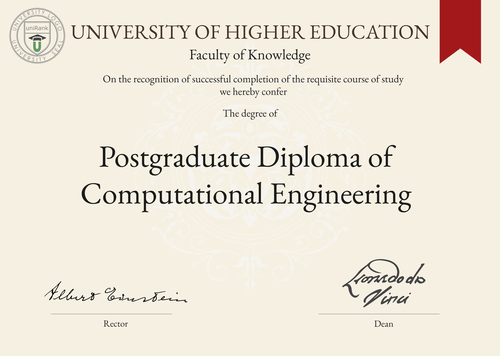
Postgraduate Diploma of Computational Engineering (PGDCE)
Guide to Postgraduate Diploma of Computational Engineering Program/Course/Degree
Postgraduate Diploma of Computational Engineering (PGDCE)

Program Name:
Postgraduate Diploma of Computational EngineeringProgram or Degree abbreviation:
PGDCEDuration range:
The duration of the program can vary depending on the country or university, typically ranging from 1 to 2 years.Tuition range:
The tuition fees for the program can vary depending on the country or university, typically ranging from $10,000 to $30,000.Overview:
The Postgraduate Diploma of Computational Engineering is a comprehensive program that equips students with the necessary skills and knowledge to apply computational methods in engineering disciplines. It focuses on the use of computer simulations, mathematical modeling and data analysis to solve complex engineering problems.Curriculum Overview by year:
- Year 1: Introduction to Computational Engineering, Numerical Methods, Engineering Mathematics, Programming for Engineers - Year 2: Advanced Computational Techniques, Finite Element Analysis, Computational Fluid Dynamics, Optimization TechniquesKey Components:
- Computational Methods: Learn various computational techniques and algorithms used in engineering analysis and design. - Mathematical Modeling: Understand how to develop mathematical models to represent real-world engineering problems. - Programming: Gain proficiency in programming languages commonly used in computational engineering. - Simulation and Analysis: Apply computational methods to simulate and analyze engineering systems and processes.Career Prospects:
Graduates of the program can pursue careers in various industries, including aerospace, automotive, energy and manufacturing. They can work as computational engineers, simulation analysts, research scientists, or consultants, contributing to the development and optimization of engineering systems.Salary Expectations:
The salary expectations for graduates of the program can vary depending on factors such as location, industry and experience. On average, computational engineers can earn a salary ranging from $70,000 to $120,000 per year. For a more accurate understanding of salary expectations, you can utilize the Job Sites Search Engine, from our sister site jobRank, which searches over 4,600 job sites worldwide. Make sure to specify not only the job title but also the country you are interested in.Conclusions:
It is important to note that the duration, tuition fees, curriculum, key components, career prospects and salary expectations of the Postgraduate Diploma of Computational Engineering program can vary depending on the chosen country or location for studying the program, as well as the chosen university. Visitors interested in pursuing this degree are encouraged to use the uniRank World Universities Search Engine to find institutions offering this specific degree worldwide.World Universities Search Engine
search for Postgraduate Diploma of Computational Engineering (PGDCE) and add the Location (country, state etc.) or specific University you are interested in studying at.
Query examples:
- Postgraduate Diploma of Computational Engineering (PGDCE) United States
- Postgraduate Diploma of Computational Engineering (PGDCE) United Kingdom online
- Postgraduate Diploma of Computational Engineering (PGDCE) Australia international students
- Postgraduate Diploma of Computational Engineering (PGDCE) University of California
- Postgraduate Diploma of Computational Engineering (PGDCE) University of London tuition fees
- Postgraduate Diploma of Computational Engineering (PGDCE) University of Sydney scholarships
Share Program/Course
Interesting? Share this program/course/degree info with your friends now.